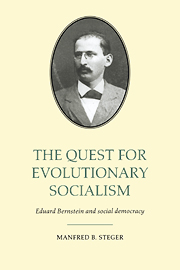Introduction: the nature of Bernstein's quest
Published online by Cambridge University Press: 06 October 2009
Summary
More than thirty years ago, Sidney Hook, the late historian of socialist thought, lamented the fact that “Eduard Bernstein has not yet come into his own.” Though Bernstein, the “Father of Marxist Revisionism,” escaped the cruel fate of many of his socialist contemporaries who fell prey to historical oblivion, Hook's lucid observation continued to remain true, at least in the Anglo-American context, until the late 1980s.
When I began my study of Bernstein's life and political thought in 1989, Peter Gay's important, but dated volume still represented the only full-scale Bernstein biography available in English. Within the next three years, however, monumental historical changes gave my scholarly efforts new significance: the Berlin Wall crumbled, the Iron Curtain disappeared, and the Soviet Union dissolved. Indeed, the death of Marxism-Leninism rekindled lively discussions on the fate of socialism in general, including the ailing Western European model of social democracy. Critical questions abounded regarding the feasibility of any radically egalitarian reforms in our era of globally integrated capitalism. A century after the famous “Revisionist Controversy” of German social democracy, Bernstein's model of “evolutionary socialism” became once again the focus of heated debates.
Indeed, a number of new publications made accessible translations of both Bernstein's early and later writings.
- Type
- Chapter
- Information
- The Quest for Evolutionary SocialismEduard Bernstein and Social Democracy, pp. 1 - 16Publisher: Cambridge University PressPrint publication year: 1997



